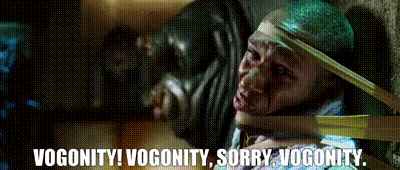The Vogon lifecycle of human progress
In “The Hitchhiker’s Guide to the Galaxy” by Douglas Adams, Vogons are one of the universe’s most unpleasant species to avoid at all costs.
They are unimaginably bureaucratic and unpleasant in every way. Completely devoid of any curiosity or creativity, new ideas require re-filing which they see as a suspicious and potentially criminal activity, punishable by the third worst poetry in the galaxy—causing physical harm to those who hear it.
Adams uses Vogons as the ultimate satire of bloated, joyless bureaucracies who exist not to move the universe forward, but to ensure that nothing whatsoever happens without filling out the proper forms at precisely 3:17 pm on the third Thursday every other the month except February.
If, like me, you’ve noticed that all the spirit has been stomped, flattened, and filed under Miscellaneous in public discourse and you feel a bit singed around the edges, take heart. The Vogon lifecycle is merely a season. Granted, a very long, tediously beige season involving an alarming number of forms, but it does, eventually, give way to redemption.
Consult the chart below to determine exactly how far along we are in the bureaucratic swamp, thus improving your chances of escaping before someone starts reciting Vogon poetry.
Phase 1: “Eureka! Or something like that.”
Mood: Like children discovering a box of fireworks and deciding the safest place to test them is indoors.
Examples:
Einstein tossing completely bonkers and brilliant theories with Schrodinger over coffee and upending how we see reality
NASA points at the moon and says, “That looks doable.”
Steve Jobs hides in a garage making shiny rectangles
Vogon Signs: None. This is the only phase in which Vogons have been observed to nod politely and leave the room, knowing their reign is coming.
Phase 2: Peak human achievement
Mood: Everyone’s thrilled. Even the pessimists are too busy inventing things to write gloomy think pieces about them.
Examples:
The Human Genome Project actually finishes something ahead of schedule
Spielberg and Lucas ruin cinema for everyone by being too good at it
The Internet arrives and people still think it will be “mostly educational”
Vogon Signs: Early jargon starts creeping in—acronyms like HTTP or DNA, intended to speed communication but mostly used to exclude your grandma from conversations
Phase 3: “We need standards”
Mood: Confidence bordering on smugness. The gates to the ivory tower are built, locked, and fitted with tasteful No Soliciting signs.
Examples:
Coding languages get standardized
Review boards begin reviewing things
Think tanks start producing thoughts
Vogon Signs: Formalized language. Alternative approaches are now tolerated only if you agree to sit quietly in important meetings
Glossary:
“This question has already been settled.” → We picked an answer years ago and are too embarrassed to check if it’s wrong.
“That’s a fringe view” → You are a fringe person and we’re allergic to fringes.
Phase 4: “This is how it’s done”
Mood: You may only be creative if your creativity has been pre-approved before you were hired
Example:
Journalism that serves the story only after serving the advertiser
Film studios producing “Fast & Furious 14: This Time It’s Family, Again.”
Innovation departments innovating ever more elaborate ways to avoid innovation
Vogon Signs: The “One True Framework” emerges. Anything else is heresy.
Glossary:
“Your work does not align with current priorities” → You poked the sacred fortress in the eye.
“There’s no peer-reviewed evidence for that” → We have evidence, but we’re ignoring it because the wrong people found it.
“We can’t risk confusing the public” → We can’t risk them asking questions we can’t control.
Phase 5: “We don’t debate that here”
Mood: Prestige becomes more important than being right. All disagreements are treated as personal attacks
Example:
Jumping back to phase 1 of the political-media complex around climate change (not the core science) will get you forever haunted as a climate denier
Whistleblowers are safely escorted out of the building via trapdoor
Think tanks and agencies politely ignore data that doesn’t fit the party menu
Vogon Signs: Deviating from the official story is seen as undermining the cause, even when the evidence is wishy washy.
Glossary:
“The conclusion has broad consensus” → We froze out anyone who disagreed, so technically it’s unanimous.
“That idea has been debunked” → Once in a hallway back in 1993
Phase 6: Form B, line 19
Mood: Defensive, joyless, and bureaucratic enough to require its own gravitational field
Examples:
Entire research teams producing nothing but compliance reports
Funding cycles determined by whoever can say “synergy” in all seriousness
Vogon Signs: Curiosity is stuffed and mounted on the wall
Glossary: “That’s not how we do things here.” → You skipped subsection 7. We cannot allow this sort of anarchy.
Phase 7: “Why does no one care anymore?”
Mood: Irrelevant and oddly proud of it
Examples:
Indie creators and grassroots groups surge while the old guard releases increasingly baffling press statements about integrity
Governments and institutions declare their own irrelevance to be proof of strength
Vogon Signs: Outsiders have stopped paying attention entirely. Insiders respond by doubling down on exactly the behavior that made them irrelevant.
Glossary: “We must protect the integrity of the field.” → The field is a smoking crater, but the fence around it is in excellent condition





I’ve always thought the Vogon’s are the most like what’s happened to the US over the past 20 years. The Obama presidential library is super Vogon-inspired.